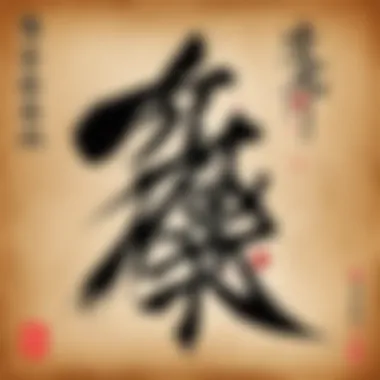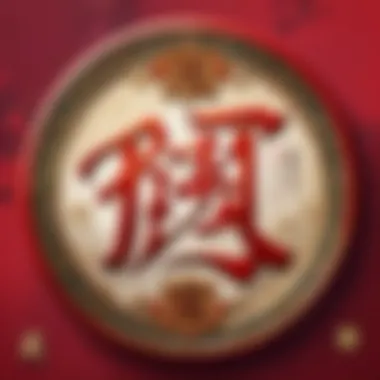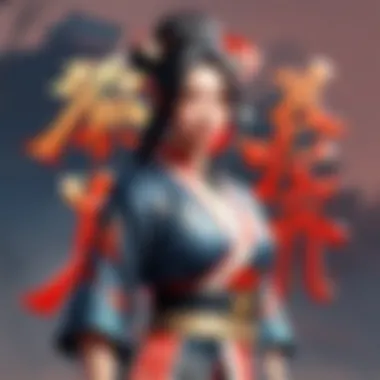Unveiling the Enigmatic World of Chinese Characters and Naming Traditions


Game Overview
Exploring the intricate realm of Chinese letters and naming customs provides a captivating journey into a rich cultural tapestry. It delves into the essence and significance of Chinese characters, unraveling a profound artistry in naming practices. Within the heart of Chinese culture lies a fascinating interplay of linguistic symbols, each stroke carrying a world of meaning and tradition.
Prelude
Buckle up for a riveting journey into the realm of Chinese letter names - a domain where tradition, culture, and symbolism converge to sculpt identities and narratives. This article serves as a beacon, shining light on the nuanced intricacies of Chinese characters and their pivotal role in personal and cultural contexts. By delving into the art of naming in Chinese culture, we unravel threads of legacy and significance that weave through the fabric of society.
Understanding Chinese Characters
Chinese characters stand as veritable tapestries of linguistic complexity, embodying centuries of evolution and cultural resonance. The Complexity of Chinese Characters beckons with its labyrinthine strokes and multifaceted meanings, offering a glimpse into a world where each stroke carries profound significance. Meanwhile, the Historical Evolution of Chinese Characters charts a fascinating trajectory of change and resilience, showcasing how these characters have weathered the sands of time, each stroke preserving a slice of history within its intricate form.
The Complexity of Chinese Characters
Step into the maze of The Complexity of Chinese Characters, where strokes dance in harmony to unveil layers of meaning and tradition. The enigmatic nature of these characters captivates scholars and enthusiasts alike, serving as both a linguistic marvel and a cultural cornerstone. Each brushstroke infuses life into characters, a testament to the rich heritage encapsulated within the script.
Historical Evolution of Chinese Characters
The antiquity of Chinese characters resonates through the corridors of time, bearing witness to dynasties rise and fall. The Historical Evolution of Chinese Characters paints a vivid picture of adaptation and innovation, mirroring the resilience of a civilization grounded in its linguistic roots. From oracle bones to digital realms, these characters have morphed and transformed, yet their essence remains etched in the annals of Chinese history.
Importance of Names in Chinese Culture
Names in Chinese culture transcend mere labels, embodying a deeper reflection of identity and heritage. Names as a Reflection of Identity are not mere words but vessels of ancestral wisdom and aspirations. Each name carries the weight of generations, a moniker that shapes destinies and echoes virtues of the past. Similarly, Cultural Symbolism in Chinese Naming adds layers of meaning and depth to the naming process, infusing names with auspicious symbols and cultural ethos.
Names as a Reflection of Identity
Immerse yourself in the tapestry of Names as a Reflection of Identity, where every name conceals a story waiting to be unraveled. The resonance of a name transcends time and space, connecting individuals to their roots and the aspirations of their lineage. Through names, identities are molded, pathing the way for a legacy that whispers through the ages.
Cultural Symbolism in Chinese Naming


Behold the symphony of Cultural Symbolism in Chinese Naming, where names become vessels of culture and tradition. Each character chosen carries auspicious meanings and serves as a conduit for virtues and blessings. From the harmonious balance of yin and yang to the celestial dance of celestial bodies, every name woven in symbolism becomes an ode to the rich cultural tapestry of China.
Structure of Chinese Names
In understanding the realm of Chinese names, a meticulous examination is crucial to grasp the nuances embedded in this cultural practice. Descent into the intricacies of Chinese names reveals a profound significance that reverberates through generations. The structural foundation of Chinese names is a tapestry woven with threads of tradition, symbolism, and familial heritage. It is not merely a label but a vessel carrying the legacy of ancestors and aspirations of the future. Exploring the structure of Chinese names sheds light on the meticulous thought process behind each component.
Formation of Chinese Names
Family Name (Xing)
Regarding Family Name (Xing), it holds a pivotal position in the architecture of Chinese names, signifying lineage and ancestry. The essence of the family name encapsulates a rich history, encapsulating the collective identity of generations. Choosing a family name involves a deep-rooted respect for heritage and a connection to familial roots. This integral element of Chinese names carries a sense of honor and continuity, anchoring individuals to their past while projecting into the future.
Given Name (Ming)
Conversely, the Given Name (Ming) complements the family name, adding a personal touch to one's nomenclature. The given name is a manifestation of parents' aspirations, cultural values, and sometimes even auspicious hopes for the individual. It is a window into the soul of the named, reflecting characteristics, virtues, or aspirations. The given name bestows uniqueness upon the individual, setting them apart amidst a vast sea of identities.
Meaning and Symbolism in Names
Pictographic Meanings
Delving into Pictographic Meanings unravels a realm where characters portray concepts, objects, or even sounds. This facet of Chinese names brings forth a visual language, where strokes of a brush convey deeper meanings beyond mere words. Each character becomes a piece of art, intertwining visual and semantic dimensions to create a rich tapestry of symbolism and significance.
Ideographic Significance
In the realm of Ideographic Significance lies a treasure trove of cultural connotations and historical legacies. Ideograms in Chinese names encapsulate abstract ideas, emotions, or philosophical concepts. The usage of ideographic characters infuses names with profound symbolism, connecting individuals to broader cultural narratives and evoking layers of interpretations. Each ideogram becomes a vessel brimming with meaning, adding depth and significance to the bearer's identity.
Cultural Significance
In delving into the deep realm of Chinese letters and naming conventions, it is imperative to understand the immense cultural significance intertwined with these practices. Chinese naming customs reflect a rich tapestry of historical traditions and philosophical beliefs that have endured through generations. The act of naming holds profound importance in Chinese culture, serving as a vessel for identity expression and cultural preservation. Names are not merely labels but embodiments of heritage, values, and aspirations, encompassing profound symbolism and depth that resonate with the essence of Chinese civilization.
Historical Context


Confucian Influence on Naming Practices
The influence of Confucian ideology on Chinese naming practices cannot be overstated. Confucian principles emphasize the significance of social harmony, filial piety, and ancestral respect. Consequently, names are chosen meticulously to reflect these virtues, with an emphasis on maintaining familial continuity and moral values. Confucian naming practices prioritize the use of characters imbued with auspicious meanings and virtuous connotations, reflecting a deep reverence for tradition and hierarchy. This cultural heritage shapes not only individual names but also societal values, perpetuating Confucian virtues across successive generations.
Dynastic Influence on Naming
The dynastic evolution in China has profoundly impacted naming conventions, reflecting the prevailing political and cultural ethos of each era. Dynastic naming influences encompass a wide array of factors, including imperial edicts, symbolic motifs, and linguistic preferences specific to distinct dynasties. Names often bear marks of dynastic affiliation, adhering to prescribed formats and honoring imperial decrees. Dynastic naming practices revere historical continuity, legitimizing power structures, and expressing loyalty to the ruling elite. While fostering a sense of cultural continuity, dynastic naming also signifies social status and political alignment within the intricate tapestry of Chinese society.
Modern Implications
Adaptation of Traditional Naming for Contemporary Use
The adaptation of traditional naming practices to modern contexts represents a dynamic evolution in Chinese nomenclature. Contemporary naming reflects a syncretic blend of traditional values and global influences, catering to shifting social dynamics and individualistic preferences. Adapting traditional naming for contemporary use involves balancing cultural heritage with innovation, striving to reconcile age-old customs with modern sensibilities. This harmonious fusion results in names that encapsulate both ancestral legacies and modern aspirations, bridging the gap between past and present within the fluid landscape of Chinese society.
Global Influence on Chinese Naming Trends
In an increasingly interconnected world, global influences exert a profound impact on Chinese naming trends, reshaping traditional conventions and fostering diversity in naming practices. Globalization has facilitated cross-cultural exchanges, allowing for the integration of foreign elements and innovative naming styles into the Chinese naming repertoire. The global influence on Chinese naming trends manifests in the adoption of foreign names, bilingual combinations, and cosmopolitan naming aesthetics that transcend geographical boundaries. While enriching the cultural tapestry of Chinese names, global influences also pose challenges in preserving indigenous naming customs amidst the influx of external trends, raising questions of identity, authenticity, and cultural hegemony.
Art of Naming
In delving into the intricate world of Chinese letters and naming conventions, the aspect of the Art of Naming takes center stage. This section serves as a compass guiding us through the profound significance of naming practices in Chinese culture. Understanding the Art of Naming unveils a realm where every stroke and component of a name carries layers of meaning and symbolism. It embodies a fusion of history, tradition, and personal identity, emphasizing the meticulous care taken in choosing each character to craft a name that resonates harmoniously. The Art of Naming encapsulates the essence of individuality and cultural heritage, offering a glimpse into the rich tapestry of Chinese nomenclature.
The philosophical underpinnings in naming practices provide a lens through which we view the intricate web of meanings embedded in Chinese names. Two key elements, Yin and Yang in Naming Conventions and Harmony and Balance in Name Selection, play pivotal roles in shaping the landscape of naming traditions.
Philosophical Underpinnings
Yin and Yang in Naming Conventions
Exploring the essence of Yin and Yang in Naming Conventions unravels a fundamental concept deeply rooted in Chinese philosophy. The interplay of opposing forces, symbolized by Yin and Yang, mirrors the contrasting yet complementary aspects of the universe. Incorporating Yin and Yang in naming not only reflects balance and harmony but also signifies the interconnectedness of dualities. This holistic approach to naming bestows names with a sense of equilibrium and unity, echoing the timeless wisdom of Chinese thought. Embracing Yin and Yang in Naming Conventions offers a nuanced way to infuse names with depth and harmony, resonating with the intricacies of Chinese cultural essence.


Harmony and Balance in Name Selection
Delving into the notion of Harmony and Balance in Name Selection sheds light on the meticulous craftsmanship involved in crafting Chinese names. The quest for harmony guides the selection of name components, ensuring a coherent blend that captures the essence of the named individual or entity. Establishing a balance between sounds, meanings, and cultural connotations elevates the significance of each name, infusing it with a harmonious resonance. The emphasis on Harmony and Balance in Name Selection underscores the deliberate precision in creating names that not only sound melodious but also carry profound symbolic weight. This thoughtful approach to name selection embodies the beauty of equilibrium and precision, enriching the art of naming in Chinese culture.
Naming Etiquette
As we journey deeper into the realm of Chinese naming customs, the facet of Naming Etiquette emerges as a cornerstone of cultural propriety and respect. By delving into Taboos and Auspicious Elements in Names and Symbolic Meanings in Name Components, we unravel the intricate codes of conduct governing name creation and interpretation.
Taboos and Auspicious Elements in Names
Unpacking the nuances of Taboos and Auspicious Elements in Names illuminates the cautious approach to name selection prevalent in Chinese culture. Avoiding taboo elements and incorporating auspicious components are essential considerations when crafting names, ensuring they resonate positively with cultural beliefs and values. Understanding these taboos safeguards against unintentional missteps and promotes a sense of respect for tradition and heritage in naming practices. By embracing Taboos and Auspicious Elements in Names, individuals navigate the intricate landscape of naming etiquette with grace and reverence.
Symbolic Meanings in Name Components
Exploring the realm of Symbolic Meanings in Name Components delves into the intricate tapestry of Chinese characters and their embedded significance. Each component of a Chinese name carries symbolic weight, representing aspirations, virtues, and cultural motifs. Delving into the depths of Symbolic Meanings in Name Components unveils a treasure trove of hidden meanings and interwoven narratives. By deciphering these symbolic connections, individuals gain a deeper appreciation for the art of naming and the layers of cultural richness woven into every name. Understanding Symbolic Meanings in Name Components enhances the depth and resonance of names, forging a profound connection between language, culture, and personal identity.
Contemporary Practices
In this extensive segment, we delve into the indispensable domain of Contemporary Practices within the absorbing realm of Chinese letters and naming customs. Analyzing the evolution of naming trends in modern China is essential to grasp the dynamic nature of the subject matter. Contemporary Practices offer a window into the flexible and adaptive nature of Chinese naming conventions in response to societal and global influences. Understanding these practices provides valuable insights into the fusion of traditional values with contemporary sensibilities.
Naming Trends in Modern China
Western Influence on Chinese Naming
Within the intricate tapestry of Chinese naming conventions, the impact of Western Influence emerges as a notable phenomenon. The infusion of Western elements into Chinese naming reflects the interconnectedness of cultures in our globalized world. Western Influence brings forth a shift towards more Western-sounding names or the incorporation of Western language components. This hybridization not only broadens the scope of naming possibilities but also symbolizes cultural exchange and openness to diverse influences, adding a cosmopolitan flair to Chinese names.
Innovations in Naming Styles
Exploring the avant-garde landscape of Innovations in Naming Styles uncovers a rich tapestry of creativity and experimentation. From unique phonetic combinations to unconventional character choices, innovations in naming styles push the boundaries of tradition while preserving cultural symbolism. The fusion of modern aesthetics with traditional values ushers in a new era of naming practices, emphasizing individuality and self-expression. While these innovations breathe fresh life into Chinese naming customs, they also spark debates on the preservation of linguistic heritage and the balance between innovation and tradition.
Personalized Names
In this illuminating section, we probe into the nuanced realm of Personalized Names, where individuality takes center stage in the art of naming. The Creative Approaches to Name Selection underscore the personal agency involved in crafting a name that resonates with one's identity. Whether drawing inspiration from personal experiences, aspirations, or even fictional characters, personalized names imbue meaning and depth into the naming process. This customization allows individuals to carve out a distinct linguistic identity, fostering a sense of ownership and uniqueness.
Individualistic Expression in Naming
As we unravel the layers of Individualistic Expression in Naming, we encounter a mosaic of self-expression and cultural identity. The emphasis on individuality in naming reflects a shift towards authenticity and personalization in contemporary naming trends. By prioritizing individualistic expression, names become not just labels but reflections of one's aspirations, values, and cultural affiliations. This emphasis on individuality enriches the tapestry of Chinese naming practices, highlighting the diverse tapestry of identities within Chinese society.



